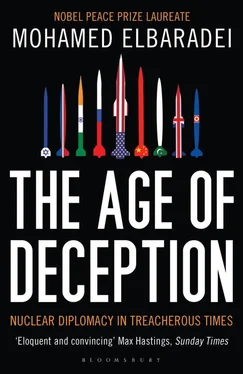David Sanger of the New York Times informed me that Karl Rove, Bush’s senior adviser, believed strongly that I had engineered the leak of the Al-Qa’qaa explosives story to the media. Rove also was said to have been incensed by my candor in a lecture at Stanford University on November 4, just a few days after the U.S. election. The speech was intended to draw lessons from the Iraq debacle and to emphasize the importance of working through multinational institutions and collective actions. I said I believed the inspections had been working and I questioned whether preemptive military action had been justified according to the principles outlined in the UN Charter. I also suggested that all parties lose when the international community is divided on critical issues of peace and security:
The Coalition lost in credibility in some people’s eyes by proceeding to use force without the endorsement of the Security Council. The United Nations lost in credibility as the body driving the action against Iraq on behalf of international legitimacy, and as a result has come to be perceived in some quarters—particularly by many in Iraq—as an adjunct of the Coalition force, and not as an independent and impartial institution. And perhaps it is the Iraqi people who have lost the most: after years of suffering under a brutal dictatorship, and after enduring the hardships brought on through an extended period of sanctions, they have had still more misery brought on by the ravages of war and the unforeseen and extended period of insurgency and civil disorder.
Given what has been said by a multitude of political analysts since then, there was nothing egregious in these remarks. The problem was that, at that time, almost no one from any prominent diplomatic quarter was willing to question publicly the actions of the U.S. government. The headline in the next day’s San Francisco Chronicle didn’t help matters: “UN Arms Inspector Slams Bush Administration.”
The harshest reality of the Iraq War and its extended aftermath—an aspect that has been disturbingly minimized in Western media reports—is the Iraqi civilian loss of life. Estimates have ranged as high as eight hundred thousand Iraqi deaths during the first three years of the war. This does not count the millions maimed or wounded, or the millions displaced from their homes and stripped of their livelihoods. The United States and the West in general have maintained a tight tally of the numbers of their soldiers killed. Yet the Iraqi civilian population remains largely faceless and nameless in media reports. The same has been true, on a somewhat smaller scale, in Afghanistan.
How can Western leaders fail to understand the outrage—the feelings of injustice, humiliation, and bitterness—that this tragedy has provoked or the cultural scars that are likely to be with us for at least a generation?
In January 2005, I met Muwafaq al-Rubaie, the Iraqi national security adviser, at a meeting of the World Economic Forum in Davos. He was working in close cooperation with the U.S. government, yet he told me that the way the Americans were managing Iraq was “criminal.” Al-Rubaie said that when the U.S. forces went into Fallujah and killed hundreds of civilians, he protested to Gen. George Casey, the top U.S. commander in Iraq at the time, telling him this was not a humane way to conduct the war. Casey’s response, as al-Rubaie relayed it, was devoid of sympathy, to put it mildly: “I am a marine, and that is how I do things.”
The U.S. and coalition actions in Iraq, and more broadly in the so-called war on terror, were mooted by many as a precursor to a clash of civilizations and as superb tools for extremists to use in recruitment. The most extreme examples included the CIA renditions, [21] “Rendition,” sometimes referred to as “extraordinary rendition,” is the process of transferring prisoners from country to country outside of judicial proceedings. CIA renditions during this period were rumored to be for the purpose of sending prisoners to countries where torture was practiced. These renditions have been the subject of multiple investigations and reports. An example is the June 2007 report from the Committee on Legal Affairs and Human Rights of the Council of Europe; that report is entitled “Secret detentions and illegal transfers of detainees involving Council of Europe member states: second report.” Retrieved at: http://news.bbc.co.uk/2/shared/bsp/hi/pdfs/marty_08_06_07.pdf .
the prison at Guantánamo Bay, and the Abu Ghraib prison abuses. These and other events and images—an almost daily diet of violence inflicted on civilians, filmed in Iraq and Afghanistan and broadcast on Arab television—suggested a basic disdain for human rights, blatant cultural discrimination, and disregard for international norms regarding the conduct of war (such as the protection of civilians and the indiscriminate use of force).
Tragically, these actions also sullied the perception of democracy across the Arab and Muslim world. Far from promoting the American values of freedom and respect for human dignity—values I had come to cherish and strongly believe in as a student in New York—the United States and its allies promoted an ethos of violence and cultural division that harkened back to an earlier era of human history.
As the head of the IAEA, I became deeply concerned that the reputation of international institutions, including the Agency, would be severely damaged by association—that we would be perceived as agents of the United States and its Western allies. Perhaps the most difficult thing for me to accept about the Iraq inspections was that they had been, in essence, a farcical exercise: that is, the United States and its closest allies had never intended to take the inspection results seriously, except insofar as they could be used to bolster the case for regime change by military force.
Since the early 1990s, I had been aware that the nuclear non-proliferation regime had entered a new era, one characterized by clandestine activity and the willingness of some countries to blatantly deceive, on a grand scale, in order to achieve political and security goals, in an environment that was sometimes conducive to such deception. What the Iraq War taught me was that this deliberate deception was not limited to small countries ruled by ruthless dictators. More than ever, the core Agency principles of maintaining independence and objectivity—or, as the inspectors liked to put it, “Verify, verify, verify”—had become an ethical code that defined our organization’s integrity.
Ultimately, the story of the Iraq War may come down to a series of hardhitting questions. If the community of nations seeks to live by the rule of law, then what steps should be taken when violations of international law result in massive civilian casualties? Who should be held accountable when military action has been taken in contravention of the law as codified in the UN Charter; or, worse still, when military action is found to have been based on faulty information, the deliberately selective treatment of information, or the promulgation of misinformation?
The United Nations Charter prohibits the unilateral use of military force by one state against another except in cases of self-defense against an armed attack. When an imminent threat is involved, the argument has been made that “preemptive self-defense” is also justified, particularly in the nuclear era. Regime change, however, is not a legal cause for war. Nor is it legal to invent a case for war when regime change is the underlying motivation. And when a war is launched, the Fourth Geneva Convention is crystal clear about the need to protect civilians, just as international humanitarian law plainly prohibits the indiscriminate use of force. [22] The four Geneva Conventions of 1949 and their Additional Protocols are at the core of international humanitarian law, the body of international law that regulates the conduct of armed conflict and seeks to limit its effects. They specifically protect people who are not taking part in the hostilities (civilians, health workers, and aid workers) and those who are no longer participating in the hostilities, such as wounded, sick, and shipwrecked soldiers and prisoners of war. The UN Security Council concluded in 1993 that the conventions had become part of customary international law, making them binding on all countries, including nonsignatories.
Читать дальше












